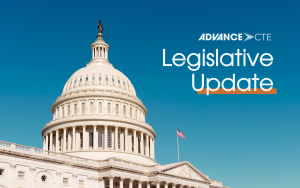 This week, lawmakers in the Senate advanced funding legislation for the upcoming 2024 federal fiscal year (FY24) that proposes an increased investment in the Carl D. Perkins Career and Technical Education Act (Perkins V*). Elsewhere, lawmakers in the House examined postsecondary policy reforms and K-12 student learning loss trends while Senators introduced important legislation intended to address persistent educator workforce shortages.
This week, lawmakers in the Senate advanced funding legislation for the upcoming 2024 federal fiscal year (FY24) that proposes an increased investment in the Carl D. Perkins Career and Technical Education Act (Perkins V*). Elsewhere, lawmakers in the House examined postsecondary policy reforms and K-12 student learning loss trends while Senators introduced important legislation intended to address persistent educator workforce shortages.
Senate Appropriators Advance FY24 Labor-HHS-ED Legislation
On Thursday, July 27, the Senate Appropriations Committee convened to consider several FY24 appropriations bills, including the Labor, Health and Human Services, Education (Labor-HHS-ED) appropriations bill– legislation that provides funding for Perkins V and other education and workforce development programs. The measure proposes a $40 million increase for Perkins V’s basic state grant program–a nearly three percent increase over current FY23 funding levels.
The measure also proposes to reduce funding for national activities authorized under Perkins V to roughly FY22 levels and was advanced out of the committee by an overwhelmingly bipartisan vote of 26-2. Advance CTE and the Association for Career and Technical Education (ACTE) issued a statement applauding this proposal and encouraging Congress to advance the legislation for enactment later this year.
While the passage of this legislation marks an important step in the wider FY24 appropriations process, the House and the Senate must still reconcile significant differences between their respective visions for FY24 funding before the start of the federal fiscal year set to begin on October 1, 2023. As previously shared earlier this month, lawmakers in the House have proposed radically different spending measures for Labor-HHS-ED and other domestic appropriations bills.
As these efforts continue to take shape, Advance CTE is closely monitoring the process and engaging with partners on Capitol Hill to ensure the funding needs of the CTE community are realized as part of the ongoing budget and appropriations process for FY24.
House Lawmakers Examine Postsecondary Education
Also on Thursday, the House Education and Workforce (E&W) Subcommittee on Higher Education and Workforce Development held a hearing titled “Lowering Costs and Increasing Value for Students, Institutions, and Taxpayers.” The hearing touched on a wide array of issues including strategies and policies that can help make postsecondary education more affordable while holding institutions and providers more accountable for learner outcomes. The hearing highlighted several state-level experiences, including efforts in Texas, to advance pay-for-performance and other similar postsecondary approaches. In addition, lawmakers and witnesses spoke at length about the forthcoming gainful employment rule which is expected to be finalized by the U.S. Department of Education later this year. An archived webcast of the hearing, including opening statements and witness testimony, can be found here.
House Holds Learning Loss Hearing
On Wednesday, July 26, the House Education and Workforce Subcommittee on Early Childhood, Elementary, and Secondary Education held a hearing titled “Generational Learning Loss: How Pandemic School Closures Hurt Students.” The hearing included testimony from several witnesses including Catherine Truitt, Superintendent of North Carolina’s Department of Public Instruction. The hearing focused on the impact school closures have had on students and highlighted troubling assessment data that points to significant decreases in student academic achievement. An archived webcast of the hearing, including witness testimony, can be accessed here.
Senators Introduce Educator Shortage Legislation
On July 19, Senators Kaine (D-VA) and Collins (R-ME), along with other members of the Senate Health, Education, Labor, and Pensions (HELP) Committee introduced the Preparing and Retaining Education Professionals (PREP) Act. This legislation would, if enacted, make a series of changes to federal policy to better support state and local efforts intended to attract and retain a high-quality educator and administrator workforce. Advance CTE is proud to support the introduction of this legislation and looks forward to working with Congress toward its enactment. More on the bill can be found here.
*As amended by the Strengthening Career and Technical Education for the 21st Century Act

